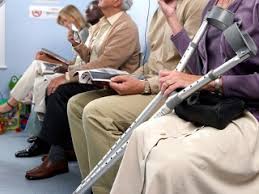May 30th, 2011 by Stanley Feld, M.D. in Health Policy, Opinion
1 Comment »

The development and use of an electronic medical record is extremely important for communication, rapid diagnosis and clinical decision making, increasing efficiency in working up patients, decreasing the cost of duplication of testing and time delays in medical care and treatment.
There are many other advantages of using a functional electronic medical records. A person could be anywhere in the world and have his medical information immediately available. The results of all testing should immediately be communicated to the treating physician. All imaging studies should be digital.
Patients’ physicians could immediately read and use them for their clinical decision making.
These are only a few of the advantages of the electronic medical record. Read more »
*This blog post was originally published at Repairing the Healthcare System*
May 17th, 2011 by Stanley Feld, M.D. in Health Policy, Opinion
1 Comment »

“The media is the message.” It does not matter if the policy has failed previously. All that is important is the effectiveness of the policy’s presentation and its ability to manipulate the polls.
The government’s purpose is to work for the people who elected it. It does not seem to be working that way at present. Bureaucrats create rules or regulations as they interpret the laws made by congress and the president. Regulations are controlled by the administration’s ideology. Many times the regulations in one area nullify the intended effect in another area.
Regulations and bureaucracy inhibit the use of common sense in policy making for the benefit of the people.
The people did not have an outlet to express their opinions or frustrations until blogging came into its own seven years ago.
Americans do not like President Obama’s healthcare reform act. They also do not like Dr. Don Berwick’s apparent disrespect for their intelligence and his infatuation with the British healthcare system.
“I am romantic about the NHS (British National Health Service); I love it. All I need to do to rediscover the romance is to look at health care in my own country.” Read more »
*This blog post was originally published at Repairing the Healthcare System*
February 5th, 2011 by Veronica Sikka, M.D., Ph.D. in Health Policy, Opinion
No Comments »
 In 1986, when Congress passed the Emergency Medical Treatment and Active Labor Act (EMTALA), hospitals and ambulance services were mandated by law to stabilize anyone needing emergency healthcare services regardless of citizenship, legal status, and/or insurance status.
In 1986, when Congress passed the Emergency Medical Treatment and Active Labor Act (EMTALA), hospitals and ambulance services were mandated by law to stabilize anyone needing emergency healthcare services regardless of citizenship, legal status, and/or insurance status.
This was instituted at the time to prevent the prevalent practice of “dumping” — refusing to treat patients because of insufficient insurance or transferring or discharging patients on the basis of anticipating high diagnosis and treatment costs. While the implications of this law are indeed very noble in providing undifferentiated care to all patients based solely on healthcare needs and not financial status, it has unfortunately led to many patients presenting to the emergency department (ED) for primary care issues.
The misconception is that the care in the ED is similar if not better (because of increased access to consult services and imaging) and quicker than waiting to see your primary care physician (PCP). A 2010 study published in Health Affairs found that 14 percent to 27 percent of visits to hospital EDs are nonemergent, such as minor infections, strains, fractures, and lacerations. The study found that all of these cases could have been appropriately triaged in urgent care centers or retails clinics.
England has a model that may be a potential solution. The healthcare goal of the National Health Services (NHS) is to “treat the right patients in the right place at the right time.” The NHS employs nurses and paramedics to handle 999 (their equivalent of our 911) triage calls with more appropriate triaging of patients based on acuity. Read more »
March 19th, 2010 by EvanFalchukJD in Better Health Network, Health Policy, Opinion
No Comments »

The Jobbing Doctor, a primary care doctor in the UK, writes about the British version of what Americans call “Pay for Performance,” or “P4P.”
He says something I’ve said many times before (like here, here, and here). Which is this: incentives fail because they try to treat medicine as an assembly line process, when it’s not.
But what’s most interesting about his post is that it could have been written by a doctor from anyplace on the planet Earth.
The Jobbing Doctor talks about a UK program that started in 2004 called the Quality and Outcomes Framework, or “QoF.” Now, the American “P4P” is a much more catchy name, so score one for American marketing. But it doesn’t matter what you call it – that which we call a rose would, by any other name smell as sweet. Read more »
*This blog post was originally published at See First Blog*
March 4th, 2010 by Steve Novella, M.D. in Better Health Network, News, Quackery Exposed
No Comments »

The House of Commons Science and Technology Committee (STC) has released a report, Evidence Check 2: Homeopathy, in which they recommend that the NHS stop funding homeopathy. The report is a rare commodity – a thoroughly science-based political document.
The committee went beyond simply stating that homeopathy does not work, and revealed impressive insight into the ethical, practical, and scientific problems caused by NHS support for an implausible and ineffective pseudoscience. Read more »
*This blog post was originally published at Science-Based Medicine*















